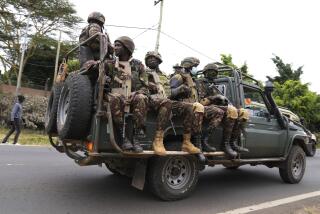Troop Patrols Add to Tension in Indonesian Capital
- Share via
JAKARTA, Indonesia — Standing on the sidewalk of Salemba Raya, a broad street lined with the charred hulks of 10 buildings torched the day before by pro-democracy protesters, a middle-aged businessman pondered the future Sunday.
“All the people need peace, need hope . . . but the trouble will continue,” he said, watching a tense face-off between soldiers and scattered groups of protesters.
The soldiers, armed with semiautomatic rifles and batons, enforced an uneasy calm in the wake of the worst anti-government riots in three decades, occasionally threatening and clearing away groups of young men when they erupted into a song of praise for opposition leader Megawati Sukarnoputri: “Mega will win! Mega will surely win!”
About a mile away, near a building that until Saturday had been Megawati’s headquarters, about 200 protesters clashed with police late Sunday morning. A similar incident took place in another part of the city later in the day.
Jakarta otherwise was largely quiet, but scattered patrols of soldiers could be seen over a wide area as a warning to the public.
Two people died in Saturday’s rioting--one after falling from a burning building, the other after having a heart attack, the army said Sunday.
It remained unclear whether anyone died when authorities took control of the party headquarters building from Megawati supporters who had been camped out there for weeks protesting a government-backed effort to oust her as leader of the opposition Indonesian Democratic Party. Megawati said that some of her supporters had disappeared and that she believes they may be dead.
The mood remained tense Sunday along Salemba Raya, where the burned-out buildings stood as symbols of the rioters’ feelings toward the rich establishment: They included four banks, a government office building and two Japanese auto dealerships--Toyota and Honda--with links to Indonesian firms. Many ordinary buildings along the street were left untouched.
Whatever the faults of President Suharto’s rule, he has succeeded here in the world’s fourth-most-populous nation--after China, India and the United States--in promoting an average economic growth rate of about 8% for many years. That has lifted millions out of poverty and created a large urban middle class.
Yet a random sampling of public opinion among ordinary people in Jakarta, from taxi drivers to store clerks, shows overwhelming support for Megawati, the daughter of Indonesian independence hero Sukarno.
A key factor in the anti-government mood is resentment against Suharto’s six children, who have grown fabulously wealthy under their father’s authoritarian rule. They are perhaps the most glaring example of the huge gap between rich and poor in this nation of 204 million.
“I think the government belongs to the Suharto kingdom,” the businessman said, summing up his views on the Suharto family as he gazed at the burned-out buildings.
The three most prominent of the children are son Bambang Trihatmodjo, 42; his flamboyant younger brother, Hutomo Mandala Putra, 33, usually called Tommy; and his sister Siti Hardiyanti Rukmana, 47, generally known as Tutut.
The children’s plunge into business began with a trading company Bambang set up around 1980. Bambang and Tommy are in the auto business. Tutut is involved in taxis and toll roads. The children run gas pipelines, ship liquefied natural gas, sell crude oil and build petrochemical plants.
More to Read
Sign up for Essential California
The most important California stories and recommendations in your inbox every morning.
You may occasionally receive promotional content from the Los Angeles Times.








